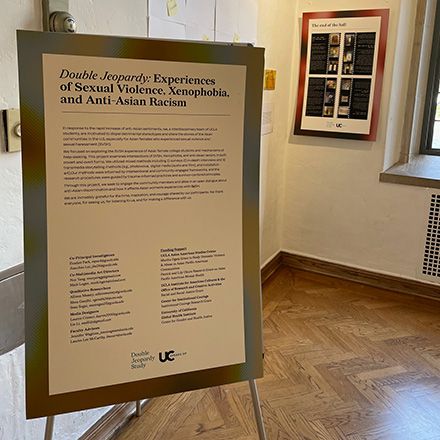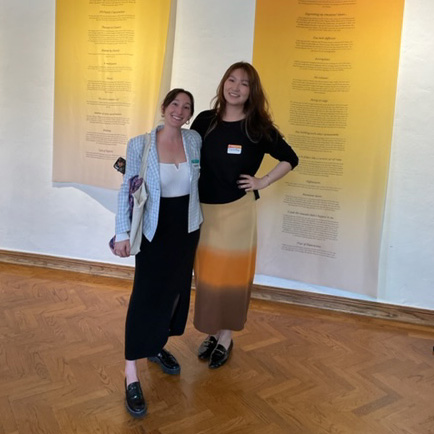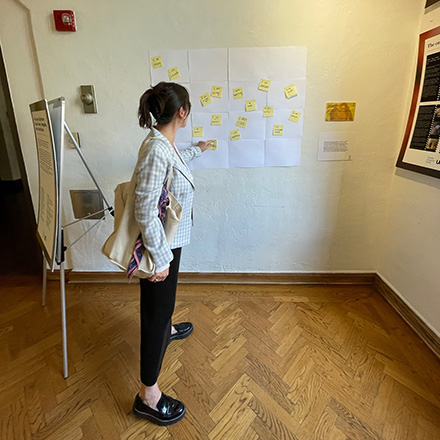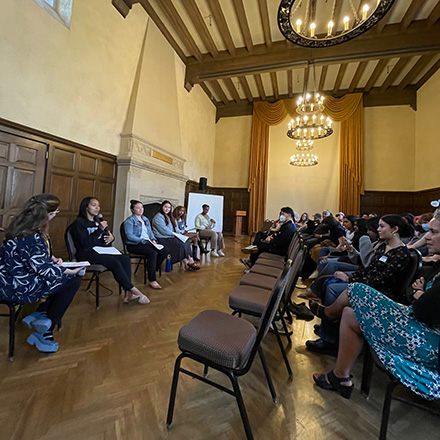What was reported as the first large cluster of the COVID-19 virus initially in Wuhan, China quickly devolved into a sharp increase in racist and violent attacks against people of Asian descent online and in-person, often the elderly. This rise in the visibility of hate crimes highlighted the often unreported anti-Asian sentiments already present in American society. Then in March 2021 the Atlanta spa shootings—where six of the eight victims were women of Asian descent—created another level of trauma for the Asian American Pacific Islander (AAPI) community, which is an umbrella term that represents a diverse group of nearly 50 distinct ethnic groups and over 100 languages.
All of these incidents were examples of a larger problem Jianchao Lai and Eunhee Park were already investigating through the lens of violence against women of Asian descent in their Ph.D. work. Lai is a Ph.D. candidate at the UCLA Luskin School of Public Affairs’ Department of Social Welfare and is originally from China and Park is a Ph.D. student at the UCLA Fielding School of Public Health, Department of Community Health Sciences and UCGHI Center for Gender and Health Justice (CGHJ) Student Ambassador and originally from South Korea. They saw an opportunity to join forces to respond to the violence and hate through UC Speaks Up–a UCGHI CGHJ program with a focus on addressing and preventing sexual assault and dating violence on college and university campuses through public health research. The research seeks to shed light on a topic that was not only overlooked in broader society but within Asian communities as well.
“As an Asian-American woman, I have been trained to keep quiet, swallow my pain and suffering, and don’t take up space. But we have to speak up,” Sun Yu Cotter, UCGHI Deputy Director explains of her experience as a first-generation Korean-American woman. “Given the complexities of the cultural context, topics such as racism and sexual violence are often silenced and under-reported in the AAPI community. I am truly impressed by Jianchao and Eunhee’s strength and courage to face this head on and lead this work.”
“I wanted to respond in a way that I know, and that’s through public health research,” says Park. As she explored grants and talked to others, she found Lai who was studying Asian children in the U.S. welfare system. Others in Lai’s field questioned her focus because of the fewer numbers of children of Asian descent within the welfare system. “There’s almost no research about Asian children in welfare,” she says. “Minoritized groups are always under-studied, Asians specifically. So, they’re also misunderstood because of the model minority myth.”
In Learning for Justice, Sarah-Soonling Blackburn describes the model minority myth as characterizing “Asian Americans as a polite, law-abiding group who have achieved a higher level of success than the general population through some combination of innate talent and pull-yourselves-up-by-your-bootstraps immigrant striving.” Like all stereotypes, this is a harmful assumption that leads to microaggressions and discrimination that places people of Asian descent into a tight box that, as Lai describes, makes the community invisible and seemingly monolithic. Both Lai and Park wanted to conduct research that flipped that narrative and shed light on the individual experiences of AAPI trans and cis women. They did this through research focused on this community that’s often overlooked in academia, specifically through the lens of sexual assault. Lai and Park hypothesized that the COVID-19 pandemic created an environment that increased the rates of sexual violence against Asian women and wanted to investigate further. This previous UCGHI story about the rise in anti-Asian hate highlights intense reactions amongst UCGHI team members, who identify as AAPI, showing the raw emotions and anger that grew during the pandemic as well as from the limited national media coverage of these hate crimes that perpetuated negative stereotypes.
With this goal to encourage a deeper look at the experiences of AAPI women amidst the increase in hate crimes, Lai and Park decided to focus on Asian women within the University of California system. Given that over 80% of UC international students come from Asian countries, there was a lot they could learn. “Asians are the highest proportion in terms of ratio of race and ethnicity among international students,” says Park, “but it doesn’t mean that the services are tailored for them.” Lai and Park teamed up with Jennifer Wagman, Ph.D. from UC Speaks Up and Associate Professor of Community Health Sciences at UCLA and Deputy Director of the UCGHI Center for Gender & Health Justice and Lauren Lee McCarthy, an artist and an Associate Professor of Design and Media Arts at UCLA, to launch their study in early 2021 called Double Jeopardy: Asian Students’ Experiences of Sexual Violence and Xenophobia during COVID-19. In the beginning, the study was extended to Asian International transgender and cisgender women who are UC students but quickly brought in Asian American and Pacific Islander students.
The first step involved a survey circulated amongst trans and cis Asian women UC students who have experienced some type of sexual violence and/or sexual harassment, of which they have garnered over 200 responses. Lai and Park hope to receive more responses between now and when the survey closes in August 2023. These surveys led to more in-depth interviews with over 50 participants for qualitative context.
The preliminary survey results showed the most common form of sexual violence experienced was sexual harassment (78%), followed by intimate partner/dating violence (45%), sexual assault (43%), and stalking (35%). They also asked about changes in sexual violence after the beginning of the COVID-19 pandemic. “Our assumption was that intimate partner violence worsened compared to other types of violence,” says Park. “The results were very similar to what we expected. About 50% said COVID-19 didn’t really affect their experiences, but about 40% said it occurred more often.” From these results, they conclude that COVID-19 did affect a specific type of violence, among dating partners.
Qualitatively, they heard a lot about the lack of campus support. “Most participants mentioned lack of culturally appropriate campus services for Asian students,” says Lai. “They also acknowledged the impact of Asian family culture and the general fetishization of Asian women.” The topic of microaggressions came up, especially among Asian International students who, coming from fairly homogenous environments, were previously unaware of these kinds of harms. But coming to the U.S. they were confused by the prevalence of the model minority myth, the fetishization of Asian women, and institutionalized racism. And the campus services, particularly the Title IX procedures, were either ineffective or sometimes even traumatizing with language barriers and a lack of trauma-informed culturally responsive services to access which prevented them from seeking help. In a previous feature story, Sun Yu Cotter also described her experience working in global health and facing harassment rooted in the fetishization of Asian women.
And while the Double Jeopardy study includes conventional qualitative and quantitative data, Lai and Park wanted to include participatory elements. They used PhotoVoice methodology with support from Lauren Lee McCarthy from using participant-created original artwork, poetry, and other creative forms of self-expression. A number of the PhotoVoice contributions were showcased in a transmedia exhibition at UCLA between April 25 and 28th, 2023. Of the 50+ interviewees, 20 made art contributions, all of them willing and eager to have their work shared publicly.
“The exhibition is meant to create this open dialogue on campus, which is often lacking,” says Lai. “To talk about it openly and normalize seeking help. The experience of sexual violence is not something that should be silenced.” Lai and Park are seeing evidence of how the use of multimedia storytelling (e.g., video, photos, text, etc.) can be an immersive and transformative experience for the artists and the viewers.




The exhibition is a manifestation of one of Lai and Park’s greatest goals for the study: to initiate a compassionate conversation grounded in creative art and substantiated by rigorous research focusing on the AAPI community.
“In our work, the broader goal we're striving for is to spark more research and practice in this area, and ultimately, to raise awareness about the need to make the Asian community more visible,” says Lai noting how the initial aims of their study are meant to contribute to a wider body of research of Asian women. They want this study to push more research and create a dialogue in academia that isn’t happening by recognizing the diversity of the AAPI community. “The model minority myth has rendered our community invisible for so long,” says Lai, “but we want to emphasize the importance of recognizing each individual's unique experience."
Students can learn more about the study here. Additionally, if you are an AAPI woman (both cis- and trans-women) who has experienced some form of sexual violence and is a student in the UC system, you can take this 5-10 min survey as a part of the study between now and August 2023 (all respondents receive a $5 gift card for survey, $50 for interviews, and $50~$75 for transmedia project participation).
The Double Jeopardy Study is made possible by financial support from the UCLA Racial and Social Justice Grants Program, the UCLA Asian American Studies Center (Martha Ogata Grants for Domestic Violence and Abuse in Asian Pacific American Communities & Patrick and Lily Okura Research Grants on Asian Pacific American Mental Health), the Center for Institutional Courage (Courage Research Grant), and the AAPI Data award to assess the needs of California’s Asian American and Pacific Islander populations.
Additional Resources:
- Stop AAPI hate
- Right to be’s Bystander Intervention Training (formerly Hollaback!)
